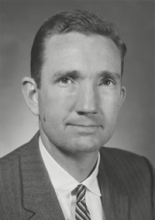Ramsey Clark

Early History/Schooling: William Ramsey Clark was born December 18, 1927 in Dallas, Texas. In 1945, he dropped out of Washington, D.C.’s Woodrow Wilson High School at the age of 17 to join the Marine Corps, and he served in Europe in the final months of WWII. He received a bachelor’s degree from the University of Texas and a law degree from the University of Chicago.
Tenure as AAG: Clark was appointed AAG of the Lands Division by President Kennedy in 1961, when Clark was only 33 years old. He has described the major issues before the Division during his tenure as including “refining our approach to the laws that related to conservation of natural resources,” particularly with respect to federal lands and resources, and the contemplation of how to deal with water and air pollution through existing or future legislation. He cites Arizona v. California, regarding the apportionment of the waters of the Colorado River, as an extremely significant case handled by the Division, “since, in a real way, it is the basis for the future development of the southwestern corner of the United States.” The Division also was engaged in a significant number of land condemnation activities to support a variety of federal programs, including missile defense programs. Clark also worked with the Indian Claims Commission to develop the then-largest Indian lands settlement in history, which granted California Indians over $29 million for 64 million acres of land west of the Sierra Nevada. Clark did not participate in any Supreme Court cases during his tenure because his father was a Justice on the Court.
Clark has described the Justice Department under Attorney General Robert Kennedy as operating “on something of a team concept.” Thus, while he was AAG of the Lands Division, Clark also was very involved in other Departmental matters, including criminal matters, antitrust cases, civil rights, Departmental litigating policies, and judicial and political appointments. In 1962, after James Meredith successfully sued to become the first African-American admitted to the University of Mississippi, Clark assisted with the supervision of the federal presence at Ole Miss and later traveled throughout the South to investigate integration in Southern schools. Clark wrote a memo to AG Kennedy regarding the need for federal legislation to enforce desegregation; Clark later played a significant role for the Kennedy and Johnson Administrations in the review and passage of the Civil Rights Act of 1964 and subsequent civil rights legislation. In late 1964, he served in the White House for a few months while simultaneously handling the work of the Lands Division.
Career: After completing his education, Clark joined his father’s Texas law firm Clark, Reed and Clark, where he remained until he was appointed AAG. Clark was originally interested in serving in the Antitrust Division, since much of his work in private practice had been in this field, but eventually was selected for the Lands Division.
After his tenure as AAG, Clark served as Deputy Attorney General from 1965 until 1967, when President Johnson appointed him the 66th U.S. Attorney General. Clark served as the Attorney General until the end of the Johnson Administration in January 1969, and played an important role in the administration’s civil rights agenda, including supervising the drafting of the 1968 Civil Rights Act.
Following his term as Attorney General, Clark worked as a law professor and was active in the anti-Vietnam War movement. He undertook two unsuccessful Senate campaigns in New York in 1974 and 1976. Clark became an antiwar and civil rights activist, founding the International Action Center, and speaking out against the United States’ 1991 and 2003 military invasions of Iraq. He has served as legal counsel to many controversial figures, including alleged war criminal Slobodan Milosevic. In 2004, Clark joined former Iraqi President Saddam Hussein’s legal team, defending him in front of the Iraqi Special Tribunal, which he argued “failed to respect basic human rights and was illegal because it was formed as a consequence of the United States’ illegal war of aggression against the people of Iraq.” Clark is a recipient of the Gandhi Peace Award and the Peace Abbey Courage of Conscience Award.
Personal: Clark’s father was former U.S. Attorney General and Supreme Court Justice Tom C. Clark. Justice Clark swore his son in as Attorney General, and then resigned from the Supreme Court to prevent any potential conflicts of interest. (President Johnson appointed Thurgood Marshall as his replacement.). Ramsey Clark’s paternal grandfather was the president of the Texas Bar Association, and his maternal grandfather served on the Texas Supreme Court. Ramsey Clark married a classmate from UT, Georgia Welch. They have two children, Tom Clark (1954-2013) and Rhonda Clark. Tom was a long serving, much beloved, Principal Deputy of ENRD’s Natural Resources Section.
This material is based on the review of a variety of historical sources, and its accuracy cannot be guaranteed. If you have any corrections or additional information about this individual or about the history of the Division, please contact ENRD.

 U.S. Department
of Justice
U.S. Department
of Justice